
In routes.go:
router.Handler(http.MethodGet, "/debug/vars", expvar.Handler())
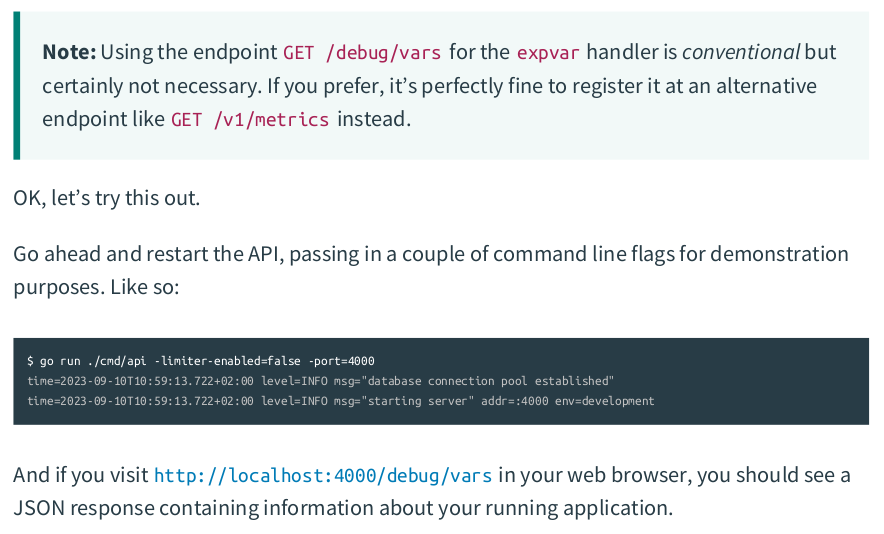
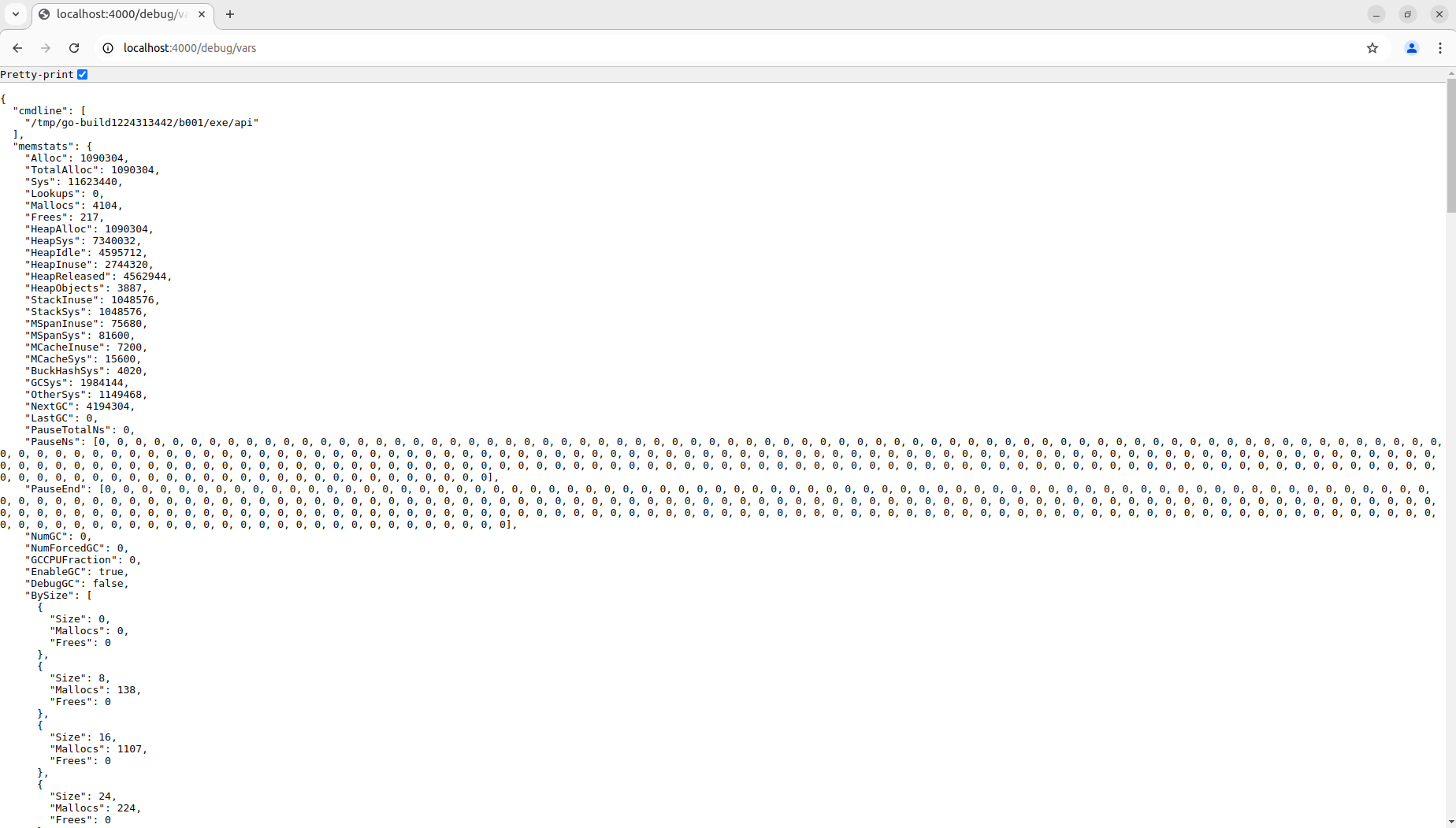
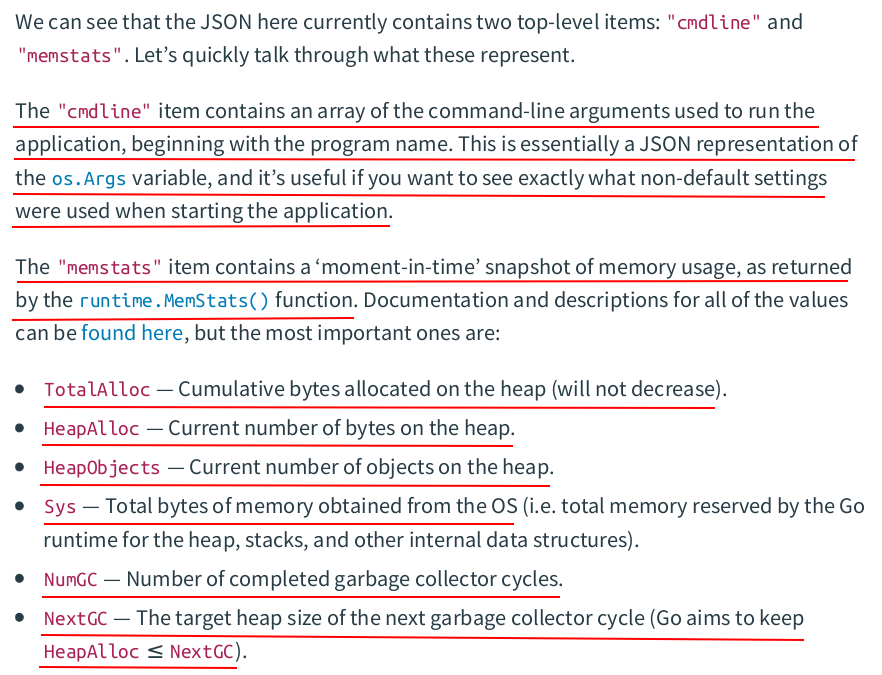
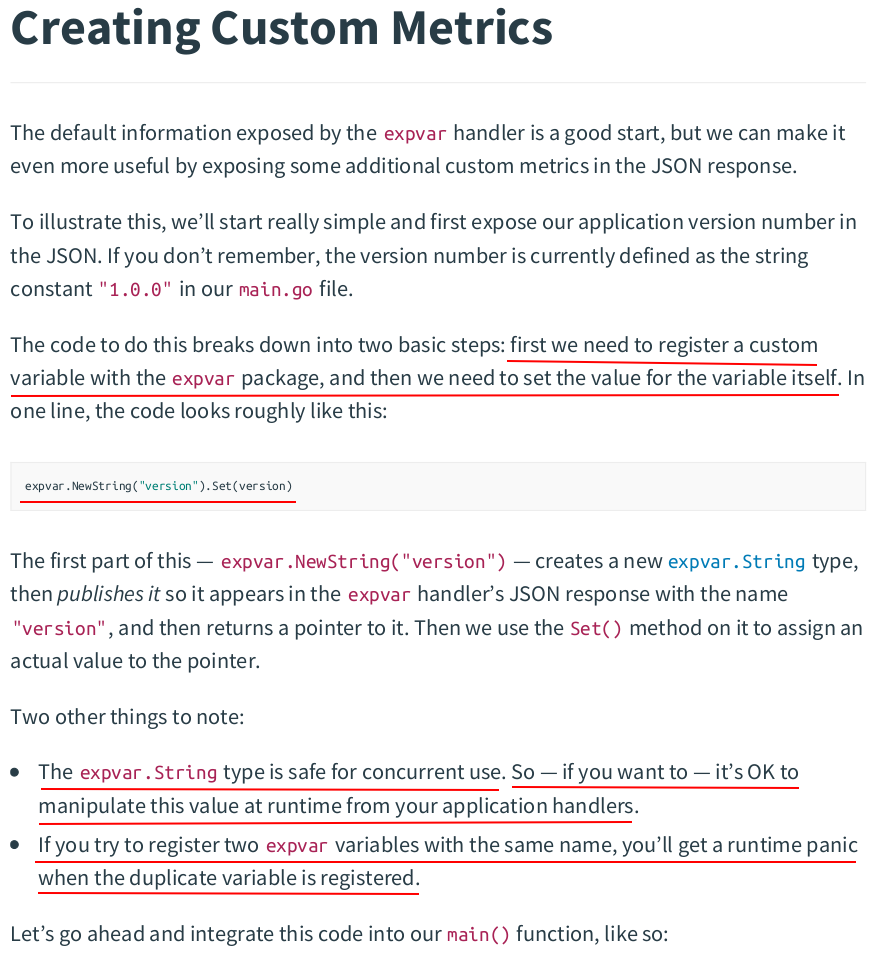
func main() { expvar.NewString("version").Set(version) ...



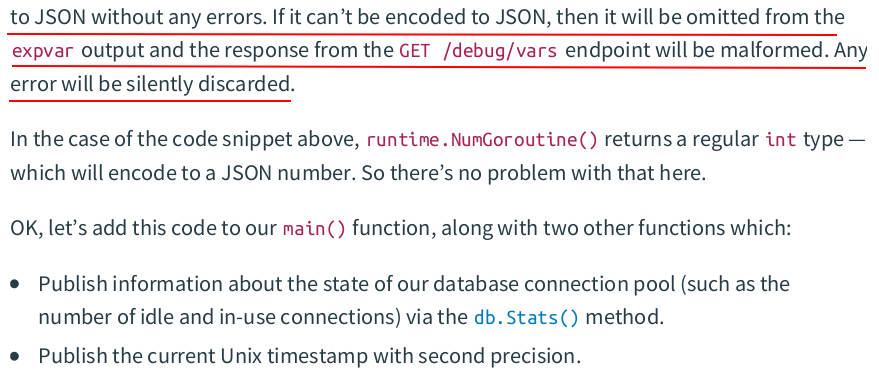
func main() { ... // Publish the version number. expvar.NewString("version").Set(version) // Publish the number of active goroutines. expvar.Publish("goroutines", expvar.Func(func() any { return runtime.NumGoroutine() })) // Publish the database connection pool statistics. expvar.Publish("database", expvar.Func(func() any { return poolWrapper })) // Publish the current Unix timestamp. expvar.Publish("timestamp", expvar.Func(func() any { return time.Now().Unix() })) // Create the application instance. app := &application{ config: cfg, logger: logger, models: data.NewModels(&poolWrapper), emailSender: &mail.EmailSender{SMTPCfg: cfg.smtp}, } ...
internal/data/db.go:
package data import ( "context" "encoding/json" "time" "github.com/jackc/pgx/v5/pgxpool" ) // PoolWrapper wraps a *pgxpool.Pool. type PoolWrapper struct { Pool *pgxpool.Pool `json:"-"` Stat struct { PoolSerialNumber int32 `json:"pool_serial_number"` // serial number of the pool in use AcquireCount int64 `json:"AcquireCount"` // cumulative count of successful acquires from the pool AcquireDuration time.Duration `json:"AcquireDuration"` // total duration of all successful acquires from the pool AcquiredConns int32 `json:"AcquiredConns"` // number of currently acquired connections in the pool CanceledAcquireCount int64 `json:"CanceledAcquireCount"` // cumulative count of acquires from the pool that were canceled by a context EmptyAcquireCount int64 `json:"EmptyAcquireCount"` // cumulative count of successful acquires from the pool that waited for a resource to be released or constructed because the pool was empty IdleConns int32 `json:"IdleConns"` // number of currently idle conns in the pool MaxConns int32 `json:"MaxConns"` // maximum size of the pool TotalConns int32 `json:"TotalConns"` // total number of resources currently in the pool, the sum of ConstructingConns, AcquiredConns, and IdleConns NewConnsCount int64 `json:"NewConnsCount"` // cumulative count of new connections opened MaxLifetimeDestroyCount int64 `json:"MaxLifetimeDestroyCount"` // cumulative count of connections destroyed because they exceeded MaxConnLifetime MaxIdleDestroyCount int64 `json:"MaxIdleDestroyCount"` // cumulative count of connections destroyed because they exceeded MaxConnIdleTime } } // Implement the MarshalJSON method on PoolWrapper struct so that it satisfies the jons.Marshaler interface. func (pw *PoolWrapper) MarshalJSON() ([]byte, error) { return json.Marshal(pw.Stat) } // CreatePool creates a *pgxpool.Pool and assigns it to the wrapper's Pool field. func (pw *PoolWrapper) CreatePool(connString string) error { ctx, cancel := context.WithTimeout(context.Background(), 5*time.Second) defer cancel() p, err := pgxpool.New(ctx, connString) if err != nil { return err } err = p.Ping(ctx) if err != nil { p.Close() return err } pw.Pool = p pw.Stat.PoolSerialNumber = pw.Stat.PoolSerialNumber + 1 pw.Stat.AcquireCount = p.Stat().AcquireCount() pw.Stat.AcquireDuration = p.Stat().AcquireDuration() pw.Stat.AcquiredConns = p.Stat().AcquiredConns() pw.Stat.CanceledAcquireCount = p.Stat().CanceledAcquireCount() pw.Stat.EmptyAcquireCount = p.Stat().EmptyAcquireCount() pw.Stat.IdleConns = p.Stat().IdleConns() pw.Stat.MaxConns = p.Stat().MaxConns() pw.Stat.TotalConns = p.Stat().TotalConns() pw.Stat.NewConnsCount = p.Stat().NewConnsCount() pw.Stat.MaxLifetimeDestroyCount = p.Stat().MaxLifetimeDestroyCount() pw.Stat.MaxIdleDestroyCount = p.Stat().MaxIdleDestroyCount() return nil }

Note that the anonymous functions in the expvar.Publish statements are run only when the /debug/vars endpoint is visited.
// Publish the number of active goroutines. expvar.Publish("goroutines", expvar.Func(func() any { return runtime.NumGoroutine() })) // Publish the database connection pool statistics. expvar.Publish("database", expvar.Func(func() any { return poolWrapper })) // Publish the current Unix timestamp. expvar.Publish("timestamp", expvar.Func(func() any { return time.Now().Unix() }))
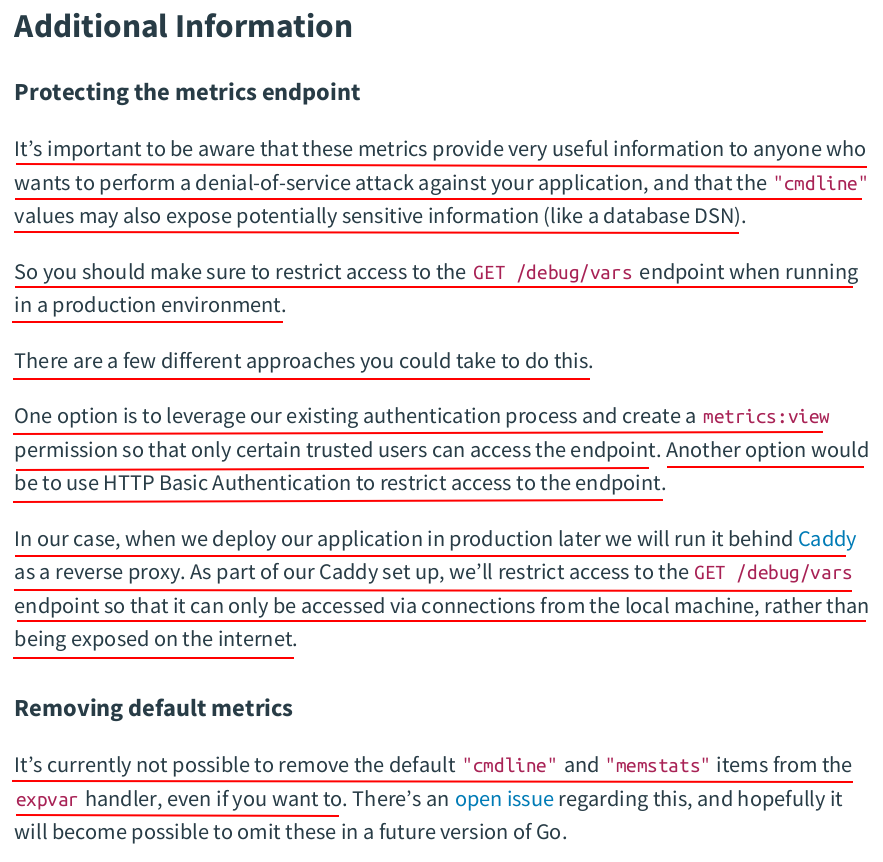
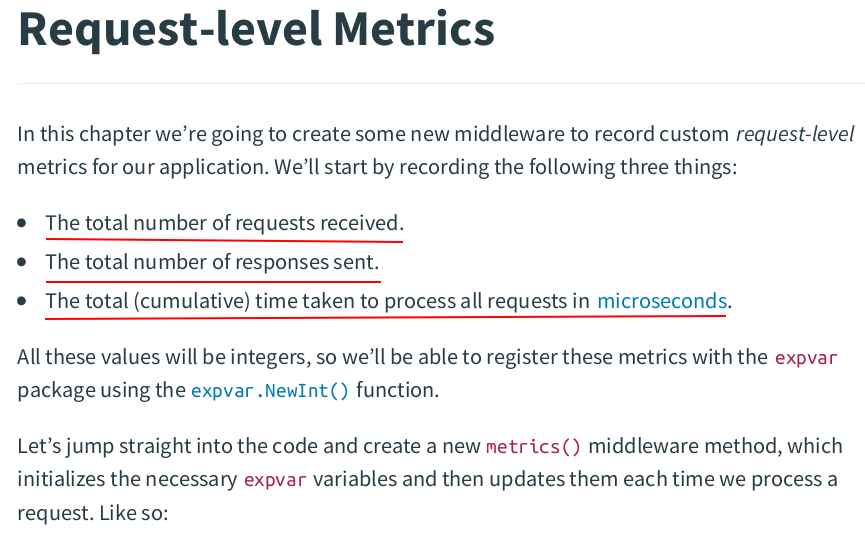
func (app *application) metrics(next http.Handler) http.Handler { var ( totalRequestsReceived = expvar.NewInt("total_requests_received") totalResponsesSent = expvar.NewInt("total_responses_sent") totalProcessingTimeMicroseconds = expvar.NewInt("total_processing_time_μs") ) return http.HandlerFunc(func(w http.ResponseWriter, r *http.Request) { start := time.Now() totalRequestsReceived.Add(1) next.ServeHTTP(w, r) totalResponsesSent.Add(1) duration := time.Since(start).Microseconds() totalProcessingTimeMicroseconds.Add(duration) }) }
In routes.go:
return app.metrics(app.recoverPanic(app.enableCORS(app.rateLimit(app.authenticate(router)))))



zzh@ZZHPC:~$ BODY='{"email": "alice@example.com", "password": "pa55word"}'
zzh@ZZHPC:~$ hey -d "$BODY" -m "POST" http://localhost:4000/v1/tokens/authentication
Summary:
Total: 6.9818 secs
Slowest: 2.0896 secs
Fastest: 1.0939 secs
Average: 1.6953 secs
Requests/sec: 28.6458
Total data: 28581 bytes
Size/request: 142 bytes
Response time histogram:
1.094 [1] |■
1.193 [0] |
1.293 [2] |■■
1.393 [2] |■■
1.492 [20] |■■■■■■■■■■■■■■■
1.592 [25] |■■■■■■■■■■■■■■■■■■■
1.691 [40] |■■■■■■■■■■■■■■■■■■■■■■■■■■■■■■
1.791 [53] |■■■■■■■■■■■■■■■■■■■■■■■■■■■■■■■■■■■■■■■■
1.890 [39] |■■■■■■■■■■■■■■■■■■■■■■■■■■■■■
1.990 [14] |■■■■■■■■■■■
2.090 [4] |■■■
Latency distribution:
10% in 1.4837 secs
25% in 1.5957 secs
50% in 1.7114 secs
75% in 1.8080 secs
90% in 1.8827 secs
95% in 1.9387 secs
99% in 2.0885 secs
Details (average, fastest, slowest):
DNS+dialup: 0.0003 secs, 1.0939 secs, 2.0896 secs
DNS-lookup: 0.0001 secs, 0.0000 secs, 0.0011 secs
req write: 0.0001 secs, 0.0000 secs, 0.0010 secs
resp wait: 1.6949 secs, 1.0938 secs, 2.0884 secs
resp read: 0.0000 secs, 0.0000 secs, 0.0001 secs
Status code distribution:
[201] 200 responses
Once that has completed, if you refresh localhost:4000/debug/vars in your browser your metrics should now look something like this:

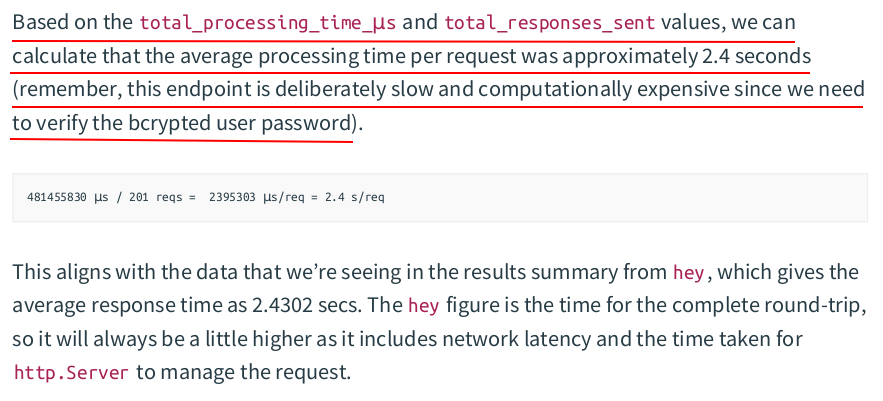


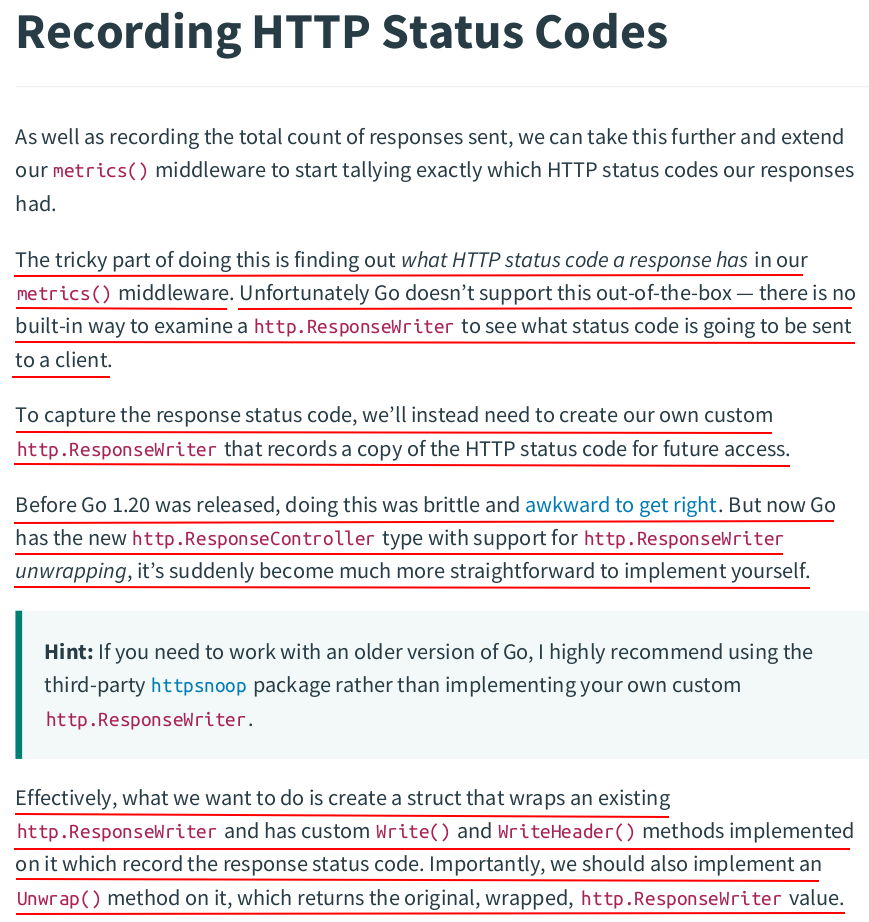
In middleware.go:
// The metricsResponseWriter type wraps an existing http.ResponseWriter and also // contains a field for recording the response status code, and a boolen flag // to indicate whether the response headers have already been written. type metricsResponseWriter struct { wrapped http.ResponseWriter statusCode int headerWritten bool } func newMetricsResponseWriter(w http.ResponseWriter) *metricsResponseWriter { return &metricsResponseWriter{ wrapped: w, statusCode: http.StatusOK, } } // Header is a simple 'pass through' to the Header() method of the wrapped // http.ResponseWriter. func (mrw *metricsResponseWriter) Header() http.Header { return mrw.wrapped.Header() } // WriteHeader does a 'pass through' to the WriteHeader() method of the wrapped // http.ResponseWriter. But after this returns, we also record the response status // code (if it hasn't already been recorded) and set the headerWritten field to // true to indicate that the HTTP response headers have now been written. func (mrw *metricsResponseWriter) WriteHeader(statusCode int) { mrw.wrapped.WriteHeader(statusCode) if !mrw.headerWritten { mrw.statusCode = statusCode mrw.headerWritten = true } } // Write does a 'pass through' to the Write() method of the wrapped http.ResponseWriter. // Calling this will automatically write any response headers, so we set the // headerWritten field to true. func (mrw *metricsResponseWriter) Write(b []byte) (int, error) { mrw.headerWritten = true return mrw.wrapped.Write(b) } // Unwrap returns the existing wrapped http.ResponseWriter. func (mrw *metricsResponseWriter) Unwrap() http.ResponseWriter { return mrw.wrapped }

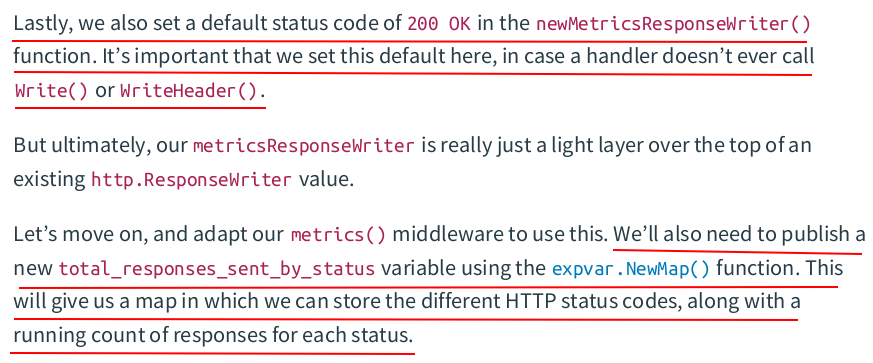
func (app *application) metrics(next http.Handler) http.Handler { var ( totalRequestsReceived = expvar.NewInt("total_requests_received") totalResponsesSent = expvar.NewInt("total_responses_sent") totalProcessingTimeMicroseconds = expvar.NewInt("total_processing_time_μs") totalResponsesSentByStatus = expvar.NewMap("total_responses_sent_by_status") ) return http.HandlerFunc(func(w http.ResponseWriter, r *http.Request) { start := time.Now() totalRequestsReceived.Add(1) mrw := newMetricsResponseWriter(w) next.ServeHTTP(mrw, r) totalResponsesSent.Add(1) totalResponsesSentByStatus.Add(strconv.Itoa(mrw.statusCode), 1) duration := time.Since(start).Microseconds() totalProcessingTimeMicroseconds.Add(duration) }) }
zzh@ZZHPC:~$ BODY='{"email": "alice@example.com", "password": "pa55word"}'
zzh@ZZHPC:~$ hey -d "$BODY" -m "POST" http://localhost:4000/v1/tokens/authentication
Summary:
Total: 7.0053 secs
Slowest: 2.3455 secs
Fastest: 1.0091 secs
Average: 1.7081 secs
Requests/sec: 28.5500
Total data: 28577 bytes
Size/request: 142 bytes
Response time histogram:
1.009 [1] |■
1.143 [1] |■
1.276 [2] |■
1.410 [11] |■■■■■■■
1.544 [19] |■■■■■■■■■■■■
1.677 [45] |■■■■■■■■■■■■■■■■■■■■■■■■■■■■■
1.811 [63] |■■■■■■■■■■■■■■■■■■■■■■■■■■■■■■■■■■■■■■■■
1.945 [39] |■■■■■■■■■■■■■■■■■■■■■■■■■
2.078 [15] |■■■■■■■■■■
2.212 [3] |■■
2.346 [1] |■
Latency distribution:
10% in 1.4508 secs
25% in 1.5917 secs
50% in 1.7303 secs
75% in 1.8421 secs
90% in 1.9413 secs
95% in 1.9940 secs
99% in 2.1478 secs
Details (average, fastest, slowest):
DNS+dialup: 0.0003 secs, 1.0091 secs, 2.3455 secs
DNS-lookup: 0.0002 secs, 0.0000 secs, 0.0011 secs
req write: 0.0001 secs, 0.0000 secs, 0.0010 secs
resp wait: 1.7076 secs, 1.0091 secs, 2.3455 secs
resp read: 0.0000 secs, 0.0000 secs, 0.0001 secs
Status code distribution:
[201] 200 responses

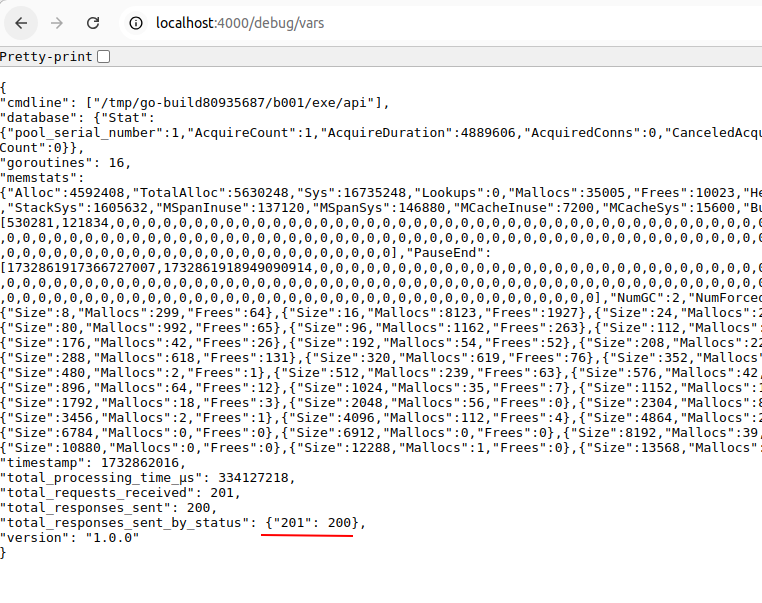
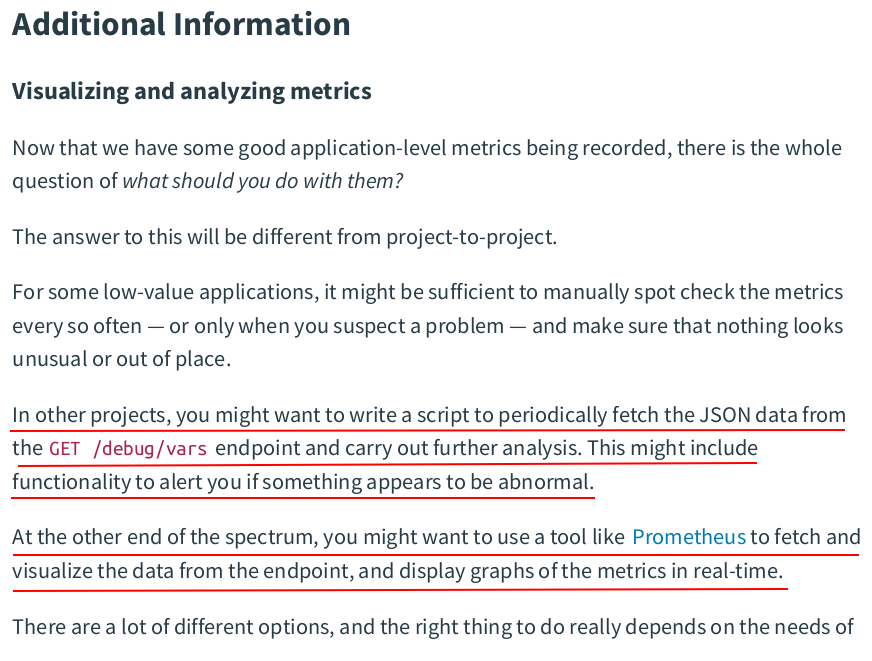

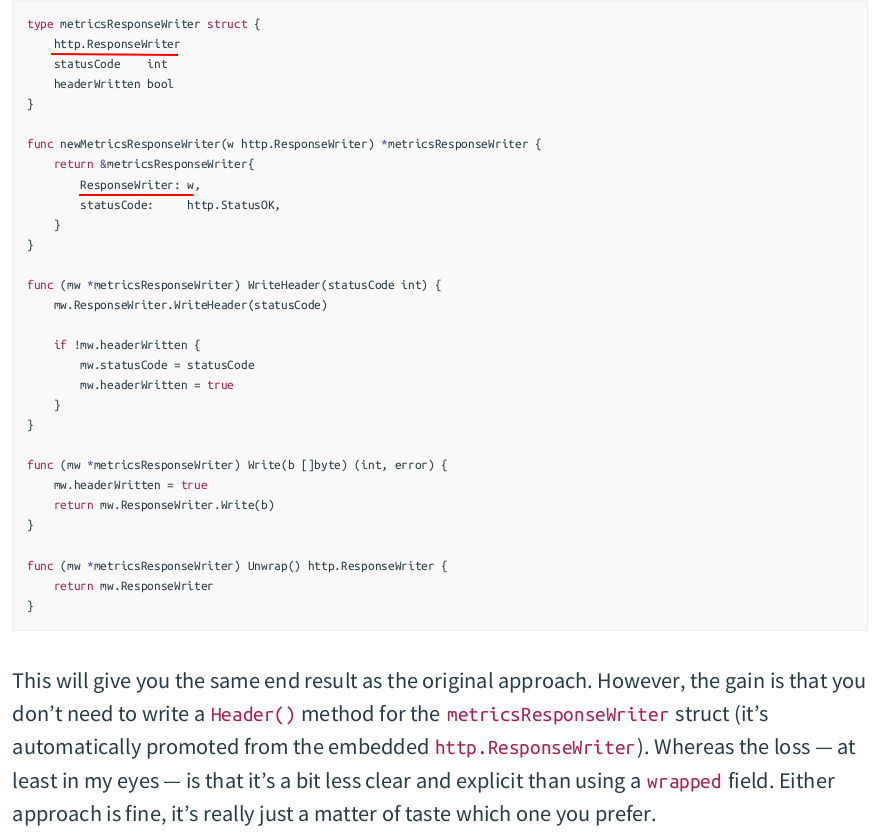





【推荐】国内首个AI IDE,深度理解中文开发场景,立即下载体验Trae
【推荐】编程新体验,更懂你的AI,立即体验豆包MarsCode编程助手
【推荐】抖音旗下AI助手豆包,你的智能百科全书,全免费不限次数
【推荐】轻量又高性能的 SSH 工具 IShell:AI 加持,快人一步
· 震惊!C++程序真的从main开始吗?99%的程序员都答错了
· 【硬核科普】Trae如何「偷看」你的代码?零基础破解AI编程运行原理
· 单元测试从入门到精通
· 上周热点回顾(3.3-3.9)
· winform 绘制太阳,地球,月球 运作规律
2023-11-28 SQLC - Installation
2023-11-28 SQLC - Why SQLC?